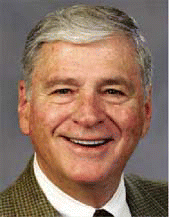WASHINGTON, DC-Generosity was the main topic of the American Academy of Otolaryngology-Head and Neck Surgery’s 2007 John Conley Lecture on Medical Ethics by Rev. William G. Enright, PhD, Executive Director of the Lake Family Institute on Faith and Giving at the Center on Philanthropy, Indiana University, at the opening ceremony of this year’s annual meeting. Drawing on Christian, Jewish, and Islamic traditions, poets, philosophers, and other writers, Dr. Enright described generosity as a virtue and a practice of the medical profession, and stated his belief that the issues involved in the practice of medicine involve one’s soul and its continuous nourishment.
Explore This Issue
November 2007Dr. Enright stated that the soul of medicine is in its calling. When medicine becomes a career or a mere job, it loses its soul. He told the attending doctors that the practice of medicine is your way of building a cathedral for your soul. He cautioned that the real world in which doctors work-the world of HMOs, insurance companies, ambulance chasers, enormous debt that new doctors have from their medical education-eats away at the historically sacred relationship between the patient and the doctor. Dr. Enright asked, How, amidst this milieu of bureaucratic overload and often the pursuit of a faceless fiscal deficiency, do we nourish our souls?
His answer is: by the practice of generosity, through which one can achieve a deeper spiritual connection to one’s chosen work. This practice involves how we are and what we are. The routes of authentic generosity are rooted in one’s sense of awe, he told listeners. Medicine, he claims, is about the capacity to value human life as a holy thing, and to recognize the life of total strangers as being as valuable as our own.
 The soul of medicine is in its calling. When medicine becomes a career or a mere job, it loses its soul.
The soul of medicine is in its calling. When medicine becomes a career or a mere job, it loses its soul.
-William G. Enright, PhD
Dr. Enright cited the French ethical philosopher Emmanuel Lévinas’ description of the experience of a doctor looking into the face of a patient as a moment of epiphany-when the face speaks, and calls to the doctor. Lévinas writes, The face asks that I not leave it alone, so I answer, here I am. Dr. Enright, like Lévinas, views this moment as both holy and ethical. We humans are all responsible for each other. Doctors are responsible for the fate of their patients; patients are responsible for the well-being of our physicians.
Leave a Reply